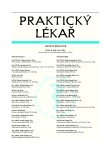-
Medical journals
- Career
The attitude towards long-term follow-up and coping with stress in patients diagnosed with melanoma
Authors: R. Konkoľová 1; H. Provazníková 2
Authors‘ workplace: Dermatovenerologická klinika 2. LF UK a FN Na Bulovce, Praha Přednosta: prof. MUDr. Jana Hercogová, CSc. 1; Ústav zdraví dětí a mládeže 3. LF UK, Praha Přednosta: doc. MUDr. Hana Provazníková, CSc. 2
Published in: Prakt. Lék. 2009; 89(1): 22-25
Category: Of different specialties
Overview
Background:
Malignant melanoma is the most lethal skin cancer and its incidence has been increasing worldwide. The prognosis of the disease is dependent on many factors. There has been no reliable adjuvant treatment available so far; although cytokines have been recently administered to high-risk patients. Emphasis is therefore put mainly on the timely detection and the relevant extent of surgical intervention, the degree of which depends on the stage of the disease. The result of this is the need for the early diagnosis of new cases and permanent follow-up of the patients in whom melanoma has been already confirmed. Patients in follow-up care are regularly checked, for the rest of their lives, at so-called melanoma commissions, usually at dermatological clinics. The permanent contact with the facts about the possible presence of the disease (being informed of the diagnosis, repeated follow-ups, waiting for the results of the examination) is stressful for these patients, although they become, to a certain extent, gradually adapted to stress.Methods:
The present cross-sectional epidemiological study was carried out in a group of patients diagnosed with stage I and II malignant melanoma (n = 124) followed for at least one year. The research was carried out in a form of anonymous questionnaires which included various types of questions concerning prevention and the current attitude of respondents toward solar radiation, the patients´ awareness of the disease and their cooperation with the health centre (institution). Attached in the appendix, there are also the PSSS questionnaire (the level of social support), Z. A. S. (Load and Stress) and BSSD (Beck´s depression questionnaire).Results and conclusion:
The results obtained revealed that the group of patients addressed shows a good management of the disease. The respondents welcome the opportunity of dispensary (follow-up) care and its benefit outweighs the load represented by the repeated controls. The values of social support were slightly above-average and the results of the Z.A.S. scale (scale “load and stress”) suggested that the stressor exposure probably is not immoderate or the respondents learned how to cope with it.Key words:
malignant melanoma, long-term follow-up, stress.
Sources
1. Beck, A.T., Rial, W.Y., Rickels, K. Short form of depression inventory: cross validation. Psychological Reports, 1974, 34, p. 1184-1186.
2. Beck, A.T., Ward, C.H., Mendelsohn, M., et al. An inventory for measuring depression. Arch. Gen. Psychiatry 1961, 4, p. 561-571.
3. Blumenthal, J.A., Burg, M.M., Barefoot, J., et al. Social support, type a behavior and coronary artery disease. Psychosomatic medicine, 1987, 49, p. 331-340.
4. Boesen, E.H., Ross, L., Frederiksen, K., et al. Psychoeducational intervention for patients with cutaneous malignant melanoma: a replication study. J. Clin. Oncol. 2005, 23, p. 1270-1277.
5. Cassileth, B.R., Lusk, E.J., Brown, L.L., et al. Factors associated with psychological distress in cancer patients. Med. Pediatr. Oncol. 1986, 14(5), p. 251-254.
6. Farquhar, J.W., Fortman, S.O., Flora, J.A., et al. Effects of communitywide education on cardiovascular disease risk factors: The Stanford Five – City Project. JAMA 1990, 264, p. 359-365.
7. Jirák, R. Psychosomatika. In: Volský, P. a kol.: Speciální psychiatrie. Praha: Karolinum, 2001, s. 133-137.
8. Mofaert, M. Psychodermatology in overview. Psychother. Psychosom. 58, 1992, 3-4, p. 126-136.
9. Pathology and Genetics of Skin Tumours. World Health Organization Classification of Tumours. Lyon: IARC Press (International Agency for Research on Cancer), 2006.
10. Saegrov, S., Holding, A.G. What is it like living with the diagnosis of cancer? Eur. J. Cancer. Care 2004, May, 13(2), p. 145-153.
11. Söllner, W., Mairinger, G., Zingg-Schir, M., Fritsch, P. Krankheitsprognose, psychosoziale Belastung und Einstellung von Melanom-patienten zu unterstützenden psychotherapeutischen Massnahmen. Hautarzt 1996, 47, s. 200-205.
12. Sollner, W., Zschocke, I., Augustin, M. Melanompatienten: Psychosoziale Belastung, Krankheitsverarbeitung und soziale Unterstutzung. Psychother. Psychosom. Med. Psychol. 1998, 48(9-10), s. 338-348.
13. Sollner, 1W., Zschoschke, I., Zingg-Schir, M., et al. Interactive patterns of social support and individual coping strategies in melanoma patients and their correlations with adjustment to illness. Psychosomatics 1999, 40(3), p. 239-250.
14. Tschuschke, V. Psychoonkologie: psychologické aspekty vzniku a zvládnutí rakoviny. Praha: Portál, 2004.
15. Tschuschke, V. Psychotherapeutic interventions with cancer patients. Psychotherapeut 2003, 48(2), p. 100-108.
16. Vosmík, F. a kol. Prekancerózy a maligní nádory. In: Dermatovenerologie. Praha: Karolinum, 1999, s. 279-299.
Labels
General practitioner for children and adolescents General practitioner for adults
Article was published inGeneral Practitioner

2009 Issue 1-
All articles in this issue
- The attitude towards long-term follow-up and coping with stress in patients diagnosed with melanoma
- Globalisation processes and harmonisation of the work of ethics committees in EU
- Chronic wound treatment in old age under supervision of a geriatrician
- Subacute thrombosis of two stents as a cause of acute myocardial infarction
- Estimation of renal function changes on the basis of serum creatinine levels – potential and limitations
- Identity of ethics committees, identity of ethicists
- Vaccination against cervical cancer and other sequelae of human papillomaviruses
- Current possibilities for the treatment of patients with epilepsy.
- Regulatory T cells and their prognostic value for head and neck oncology
- Nutritional care in premature babies after hospital discharge
- General Practitioner
- Journal archive
- Current issue
- Online only
- About the journal
Most read in this issue- Chronic wound treatment in old age under supervision of a geriatrician
- Nutritional care in premature babies after hospital discharge
- Current possibilities for the treatment of patients with epilepsy.
- Subacute thrombosis of two stents as a cause of acute myocardial infarction
Login#ADS_BOTTOM_SCRIPTS#Forgotten passwordEnter the email address that you registered with. We will send you instructions on how to set a new password.
- Career

